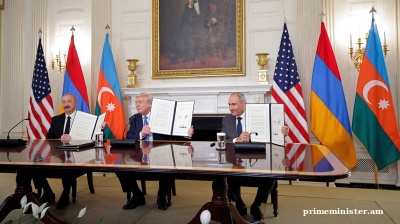The recent peace breakthrough between Armenia and Azerbaijan is a major diplomatic win for the United States and a setback for Russia, according to a new report published by the Atlantic Council.
On August 8, Armenian and Azerbaijani leaders met at the White House, initialing a peace agreement and signing a joint declaration establishing the “Trump Route for International Peace and Prosperity” (TRIPP), a corridor linking Azerbaijan with its Nakhchivan exclave through Armenian territory. While not a final treaty, the accord is a major step toward regional stability.
The report argues that the peace deal, combined with regional integration initiatives, offers a path to weaken Russia’s long-standing grip on the South Caucasus, complementing ongoing US support for Ukraine and sanctions on Moscow.
“These moves mark major wins for Armenia, Azerbaijan, and the United States. At the same time, Russia emerges as the biggest loser,” the report notes.
Its authors, human rights lawyer and senior legal consultant with the United Nations Sheila Paylan and Joseph Epstein, director of the Turan Research Center at the Yorktown Institute, argue that Russian miscalculations and disregard for its neighbours’ sovereignty have created openings for alternative diplomatic solutions.
The authors highlight Russia’s enduring imperial approach toward the South Caucasus, treating the borders of Armenia, Azerbaijan, and Georgia as “fluid markers of power, subject to revision at will”. Citing historical precedent, they note Russian President Vladimir Putin’s assertion that “the borders of Russia do not end,” and Russian Foreign Minister Sergei Lavrov’s symbolic appearance at the Alaska summit wearing a sweater with “USSR” embroidered on it.
Epstein and Paylan contend that Moscow’s heavy-handed policies have driven the South Caucasus states toward greater independence and partnership with Western powers. “Throughout the thirty-year conflict over Karabakh, Moscow played both sides to keep Yerevan and Baku dependent, seeking to dominate them,” they wrote. They point to Armenia’s reliance on Russia for energy and wheat, and Azerbaijan’s strategic alignment outside Russia’s collective security system despite ongoing Russian courting through arms sales and energy cooperation.
The report details how Russian coercion has extended beyond diplomacy. Armenia faced trade restrictions, including a dairy ban in 2023, broader agricultural import limits in 2024, and blows to the flower trade in 2025. Military support promised by Moscow was withheld during critical moments, including Azerbaijani advances in September 2022 and the 2023 retaking of Karabakh by Baku. By July 2024, Armenia expelled Russian FSB border guards from its airport, signalling a decisive pivot away from Moscow.
Russia has also sought to intimidate Azerbaijan, as detailed in the report. Following the downing of an Azerbaijani civilian plane by Russian air defences in December 2024, Baku closed the Russian state-sponsored media outlet Sputnik. Russian authorities retaliated by detaining members of the Azerbaijani diaspora in Yekaterinburg, with two brothers, Huseyn and Ziyaddin Saffarov, killed after reported torture. Similar tactics have been observed in Central Asia, with pipeline disruptions coinciding with diplomatic moves that Moscow disfavors, the authors say.
Despite its aggressive posture, the report argues that Russia’s reliance on intimidation over persuasion has backfired, alienating neighbours and diminishing its influence in the Caucasus.
The authors argued the US has the opportunity to capitalise on the TRIPP agreement by promoting Armenia’s regional integration, accelerating the corridor’s implementation, and expanding connections to Turkey and Central Asia.
“[S]ecuring lasting peace requires more than building TRIPP — it also calls for opening new road and rail links through Armenia to Azerbaijan and Turkey, effectively stitching the region back into global commerce. Extending that connectivity to Central Asia would allow states to scale the Middle Corridor and bypass Russia,” Epstein and Paylan write. Such measures could secure critical supply chains and access reserves of rare-earth elements and strategic minerals essential for modern technologies.
Opinion

COMMENT: Czechia economy powering ahead, Hungary’s economy stalls
Early third-quarter GDP figures from Central Europe point to a growing divergence between the region’s two largest economies outside Poland, with Czechia accelerating its recovery while Hungary continues to struggle.

COMMENT: EU's LNG import ban won’t break Russia, but it will render the sector’s further growth fiendishly hard
The European Union’s nineteenth sanctions package against Russia marks a pivotal escalation in the bloc’s energy strategy, which will impose a comprehensive ban on Russian LNG imports beginning January 1, 2027.

Western Balkan countries become emerging players in Europe’s defence efforts
The Western Balkans could play an increasingly important role in strengthening Europe’s security architecture, says a new report from the Carnegie Europe think-tank.

COMMENT: Sanctions on Rosneft and Lukoil are symbolic and won’t stop its oil exports
The Trump administration’s sanctions on Russian oil giants Rosneft and Lukoil, announced on October 22, may appear decisive at first glance, but they are not going to make a material difference to Russia’s export of oil, says Sergey Vakulenko.




